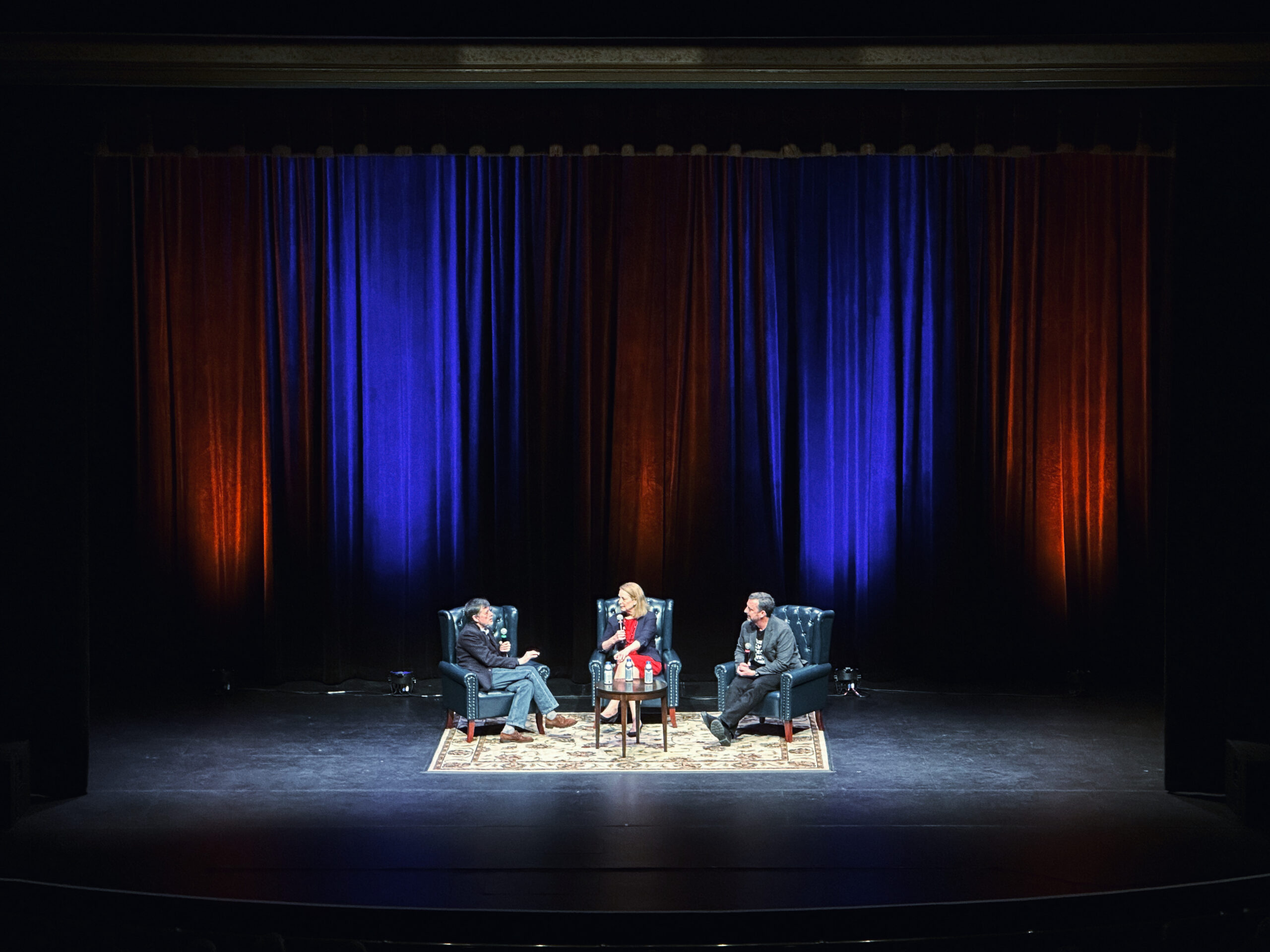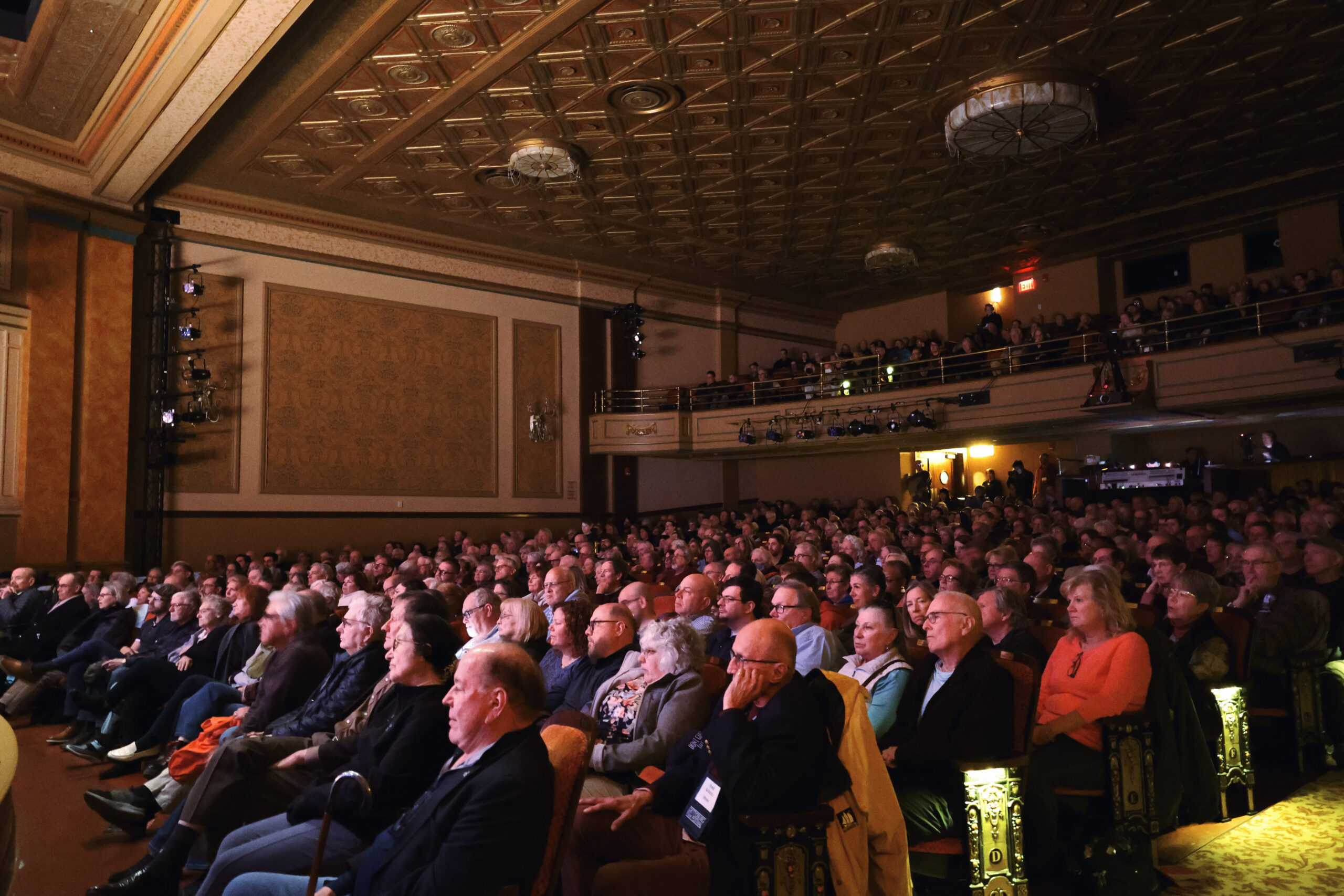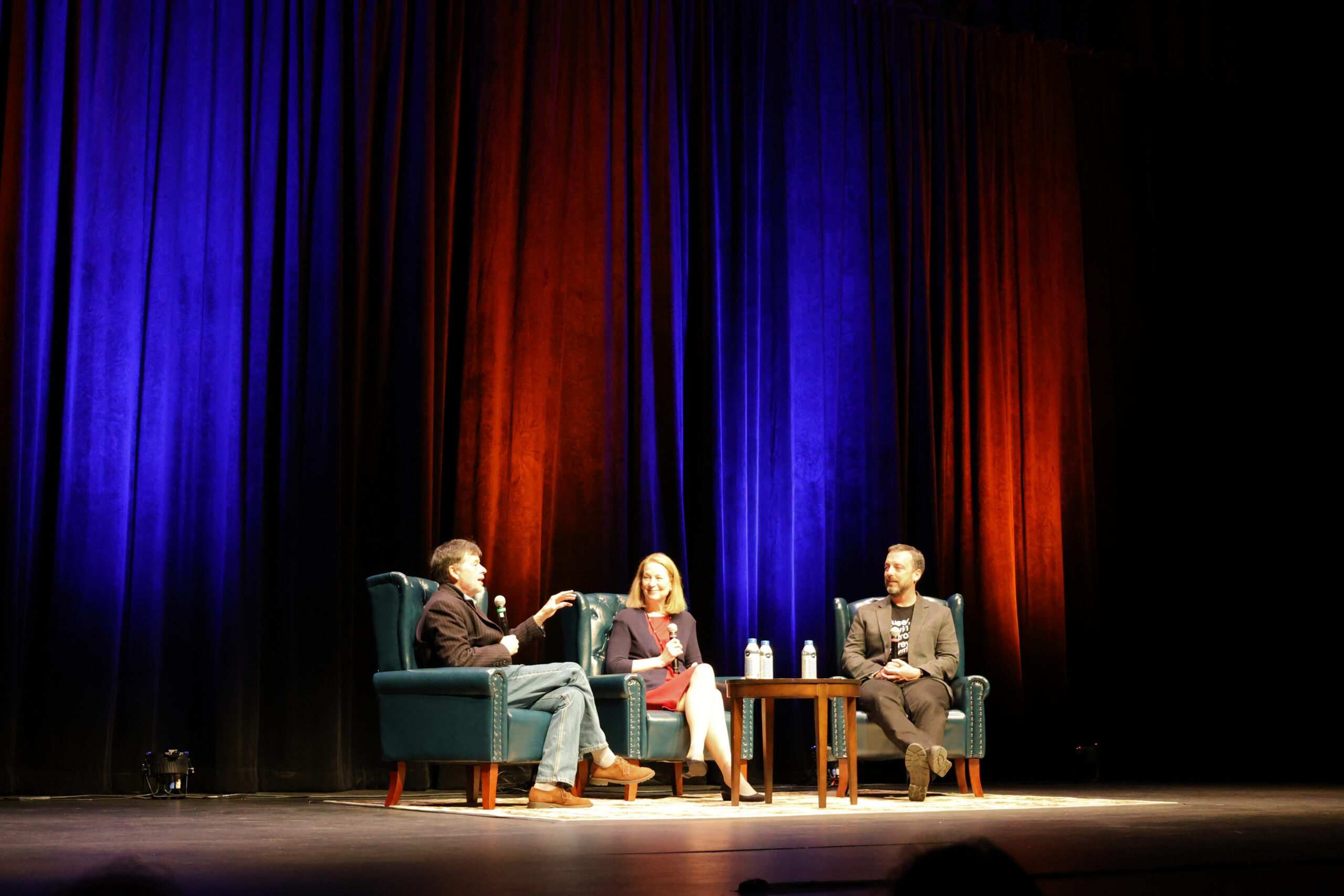
Ken Burns (left) discusses historic elections alongside Susan Eisenhower and Moderator Jake Boritt. (Photo Abror Niyazmetov/The Gettysburgian)
By Brandon Fey, Assistant News Editor
On April 5, renowned documentarian Ken Burns hosted one of the most highly-anticipated events of “The Art of Ken Burns: Gettysburg Film Festival. The event, titled “Consequential Elections,” featured a discussion between Burns and Chairman Emerita of the Eisenhower Institute at Gettysburg College Susan Eisenhower. They discussed important elections in U.S. history in light of the upcoming 2024 presidential election.
Gettysburg College President Bob Iuliano primed the event by sharing his excitement at having Burns back in Gettysburg. He expressed his gratitude to the Majestic Theater staff and the several benefactors of the film festival who made it possible. The discussion was first contextualized by the screening of selected segments from Burns’ documentaries pertaining to pivotal presidential elections in US history. These included the 1800 election of Thomas Jefferson, the 1860 election and 1864 reelection of Abraham Lincoln, the 1960 election of John F. Kennedy and the 1964 election of Lyndon Johnson. These scenes each emphasized the intense political division and turmoil that engulfed the nation during these periods.
Following the film segments, Burns and Eisenhower entered the stage with Festival Director Jake Boritt, who acted as the moderator. The discussion began with thoughts on the complexity and leadership of Lincoln. Burns began by speaking on Lincoln’s ability to understand and reconcile conflicting impulses and emotions in the face of the divided nation during his presidency. Burns attributed this skill to Lincoln’s powerful personal humility, empathy and willingness to listen to those who disagreed with him. Eisenhower added that the 16th president’s understanding of the contradictions within the country and ability to bring the Union people together was key to his success as a leader.
Burns then connected Lincoln’s value of civility to the first film segment on the election of 1800. He expressed his admiration for Alexander Hamilton, who conveyed leadership by ending the partisan deadlock in Congress by convincing his fellow Federalists to select Jefferson as president over the erratic Aaron Burr, with whom he was tied. From this point, the director expanded on the importance of civility in politics, citing examples of political incivility such as that exhibited by Senator Joseph McCarthy and the caning of Senator Charles Sumner on the Senate floor. Eisenhower concurred, emphasizing the importance of a belief in the system rather than violence and aggression. She stated that fear has had the most pivotal role in the division of the country.
“I think what is dividing this country is fear. Fear about the future, fear that we don’t have the leaders in place to help us enter a new world,” Eisenhower said.
Eisenhower also stated her belief that every major crisis in U.S. history has been overcome through free and fair elections and the peaceful transfer of power, citing the Civil War, the Great Depression and World War II as significant examples.
The conversation then shifted toward more contemporary concerns, as Burns discussed the impact of globalization on American jobs and the effect of social media in fueling division and disconnection among party lines.
“I wish to unlearn the habits of lazy learning and reinstitute ideas,” Burns said.
These trends, he argued, are making people susceptible to authoritarian ambitions propagated by extremists who preach that there is no democratic solution. Eisenhower followed with the impact of social media on leadership and disinformation. She shared that while this is a worsening issue, disinformation is nothing new and was rampant in the atmosphere of Lincoln’s election.
The discussion of electoral inevitabilities such as disinformation compelled Burns to speak about the Electoral College. He stated that despite its intention to mitigate the risks of full democracy, the recent trend of vast disconnects between popular and electoral votes suggests an issue, in that it has led to entire elections being decided by only a few counties in a handful of states. He stated because of this, political operatives are targeting these suburban districts while ignoring much of the national population. Eisenhower stated that part of the reason is the way in which both parties discourage political free-thinking. She cited a recent Gallup poll that has revealed that independent voters effectively outnumber Republicans and Democrats, but primaries encourage the two parties to ignore them by selecting more extreme candidates.
To Eisenhower’s point on the party system, Burns discussed the history of the Republican Party, from its founding in 1854 as a bulwark against slavery to its evolution into a party that he claimed has abandoned its civil rights platforms and became the “party of business.”
On a concluding note, Burns recalled Jefferson’s reflections on the American experiment and the great change it represented in the world.
“I think Jefferson’s response is so great, because my whole mantra has been Ecclesiastes: there’s nothing new under the sun, Human Nature never changes,” said Burns. “[Jefferson] says there is something new under the sun. And so I think that in the America he is speaking about, it seems to be that there’s a possibility of change and that the American experiment was the first time in human history we are creating citizens and we are no longer subjects.”
Burns and Eisenhower spoke about the discourse between the once-political rivals Jefferson and Adams, which highlighted the importance of unity and small democratic values for the country to operate effectively. This led to a final reflection on the founding of the US and the pursuit of happiness, highlighting the ongoing struggle for power and the importance of learning from the lessons of the past.
Burns concluded the event with words of encouragement for his fellow citizens, stating “If we learned about this history, if we learn ever more about it, then as Lincoln said, ‘we will save our country.’”


